|
|
|
Sort Order |
|
|
|
Items / Page
|
|
|
|
|
|
|
| Srl | Item |
| 1 |
ID:
106597
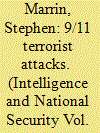

|
|
|
|
|
| Publication |
2011.
|
| Summary/Abstract |
The 9/11 terrorist attacks have been intensively examined as both tactical and strategic intelligence failures but less attention has been paid to the policy failures which preceded them. Perhaps this is due to the presumption that intelligence analysis influences decision-making as a precursor to and foundation for policy. This assumption about the influence of analysis on decision deserves a much closer examination. The 9/11 terrorist attacks provide a good case to study for greater understanding of the influence, or lack of influence, that intelligence analysis has on decision-making. Specifically, the 9/11 Commission Report identifies as a significant failure the lack of a National Intelligence Estimate on the terrorist threat between 1998 and 2001, and implies that if one had been produced it might have helped enable decision-makers to prevent the 9/11 attacks. In other words, a failure of strategic intelligence analysis lay at the foundation of the failure to prevent 9/11. But was this really the case? This article takes a closer look at the case of the missing National Intelligence Estimate by first evaluating what decision-makers knew about the threat prior to the 9/11 attacks, the policies they were implementing at the time, and the extent to which the hypothetical National Intelligence Estimate described by the 9/11 Commission would have mattered in terms of influencing their judgement and policy for the better. It concludes that the 9/11 terrorist attacks were more a failure of policy than strategic intelligence analysis.
|
|
|
|
|
|
|
|
|
|
|
|
|
|
|
|
| 2 |
ID:
178299
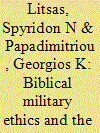

|
|
|
|
|
| Summary/Abstract |
The deployment of special forces in hostile or politically volatile environments in search of strategic/operational intelligence, though not a 21st century novelty, appeared as a distinct military activity in literature only in the early 2000s under the label ‘Special Reconnaissance’ (SR). This article argues that the concept of SR (a) originated in the biblical Israelite military tradition and is depicted in the Bible as the lapis angularis of military strategy and a practice capable of dictating military and political norms; (b) has been used as a key element of the Israel Defence Forces’ (IDF) modus operandi since 1948 thenceforth functioning in an analogous manner. To support these arguments, the theoretical and practical characteristics of Moses’ intelligence mission to Canaan as well as the IDF’s proclivity to SR are scrutinised under the general theoretical framework of political realism that assumes rational and pro-state interest course of actions. Accordingly, SR emerges as a distinctive common instrument of biblical and contemporary Israeli strategy, a fact that underlines the uninterrupted socio-political and cultural links between the past and the present of the Israeli ontology, this time via the wider concept of the Israeli military ethics.
|
|
|
|
|
|
|
|
|
|
|
|
|
|
|
|
| 3 |
ID:
145244


|
|
|
|
|
| Summary/Abstract |
This article examines the intersection of Big Data and strategic intelligence from a theoretical-conceptual viewpoint. Adopting Popperian refutation as a starting point, it approaches methodological issues surrounding the incorporation of Big Data into the intelligence cycle, and argues that Big Data analytics is best used to discern long-term developments, generate intelligence hypotheses, and adduce refuting facts. The article then briefly examines the use of Big Data via social media, an increasingly fertile platform for intelligence analysis. Finally, the article argues that despite its potential in filling our epistemic gaps, Big Data should continue to complement traditional subject-matter expertise, supported by game theory, as part of a tripartite analytical framework for strategic intelligence consisting of ‘subtext’, ‘context’ and ‘metatext’. In this respect, Big Data may well become the midwife for more open modes of intelligence management and, ultimately, a more open society.
|
|
|
|
|
|
|
|
|
|
|
|
|
|
|
|
| 4 |
ID:
032669
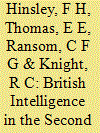

|
|
|
|
|
| Publication |
London, Her Majesty's Stationery Office, 1984.
|
| Description |
xvi, 693p.Hbk
|
| Standard Number |
0-11-630935-0
|
|
|
|
|
|
|
|
|
|
|
|
Copies: C:1/I:0,R:0,Q:0
Circulation
| Accession# | Call# | Current Location | Status | Policy | Location |
| 022574 | 940.548741/HIN 022574 | Main | On Shelf | General | |
|
|
|
|
| 5 |
ID:
102318
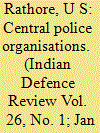

|
|
|
| 6 |
ID:
154060
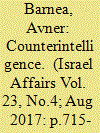

|
|
|
|
|
| Summary/Abstract |
This article discusses the differences between strategic intelligence and counterintelligence, a much less researched subfield of the intelligence discipline. One reason for this scholarly neglect is the perception of counterintelligence as highly sensitive due to its preoccupation with internal affairs, considered too confidential for open discussion. Another reason is the apparent lack of understanding of the real contribution of counterintelligence to national security. This article seeks to fill this scholarly lacuna.
|
|
|
|
|
|
|
|
|
|
|
|
|
|
|
|
| 7 |
ID:
116387
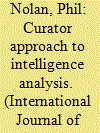

|
|
|
|
|
| Publication |
2012.
|
| Summary/Abstract |
The United States Intelligence Community (IC) is drowning in information. Analysts are losing the war against volume. The next huge "big mistake" won't come from a failure to connect the dots, but instead from missing dots buried in a mountain of noise. Every day, reports from human sources, satellite photography, and signal intercepts flood analysts in growing volumes. In the past decade, this classified flood has been doubled by a tsunami of "open source" information (OSINT)-unclassified, publicly available information from publications, blogs, YouTube videos, Twitter feeds, and so on. Over the past decade, the IC has learned to better collect and use OSINT in its analysis. Though armed with the most expensive and elaborate high-tech tools to manage big data, the IC is running faster to stay in the same place.
|
|
|
|
|
|
|
|
|
|
|
|
|
|
|
|
| 8 |
ID:
076356
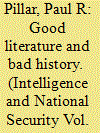

|
|
|
|
|
| Publication |
2006.
|
| Summary/Abstract |
Uncritical acceptance of the findings of the 9/11 Commission has obscured how the commission intentionally misrepresented pre-attack strategic intelligence on the threat from Al Qaeda. The commission staff used such techniques as highly selective use of material, partial truths, irrelevant references, plays on words, quotations out of context, and suggestive language leading to false inferences to portray as weak what had been a strong strategic analytical performance. The commission's misrepresentation corrupted history, damaged public understanding of the role of intelligence in counterterrorism, and helped to build support for a reorganization scheme that has made US counterterrorist intelligence worse rather than better.
|
|
|
|
|
|
|
|
|
|
|
|
|
|
|
|
| 9 |
ID:
047008
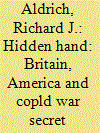

|
|
|
|
|
| Publication |
London, Jonh Murray, 2001.
|
| Description |
xv, 733p.
|
| Standard Number |
0719554233
|
|
|
|
|
|
|
|
|
|
|
|
Copies: C:1/I:0,R:0,Q:0
Circulation
| Accession# | Call# | Current Location | Status | Policy | Location |
| 044591 | 327.12/ALD 044591 | Main | On Shelf | General | |
|
|
|
|
| 10 |
ID:
072668
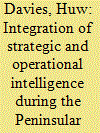

|
|
|
|
|
| Publication |
2006.
|
| Summary/Abstract |
Wellington is well known for his understanding of the importance of intelligence, but so far history has recorded that he presided over a one-man intelligence department, himself being the only analyst of what proved to be a massive quantity of raw information. New research highlighted in this article reveals that this has been an inaccurate interpretation. The British government also acted to establish a civilian network of correspondents and agents communicating with the British ambassadors to Spain and Portugal. Wellington's main priority was to integrate the 'strategic intelligence' collected by government agents with his own 'operational intelligence'. Instead, analysis was conducted more by Wellington's subordinates in the field, applying their personal localized expertise to the information they received. In this way, an early and primitive form of the staff system later developed by the Prussians was created in the Peninsular War.
|
|
|
|
|
|
|
|
|
|
|
|
|
|
|
|
| 11 |
ID:
109553
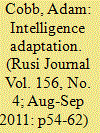

|
|
|
| 12 |
ID:
111618
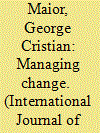

|
|
|
| 13 |
ID:
088639
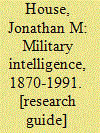

|
|
|
|
|
| Publication |
Westport, Greenwood Press, 1993.
|
| Description |
xv, 165p.
|
|
|
|
|
|
|
|
|
|
|
|
Copies: C:1/I:0,R:0,Q:0
Circulation
| Accession# | Call# | Current Location | Status | Policy | Location |
| 039352 | 355.3432/HOU 039352 | Main | On Shelf | General | |
|
|
|
|
| 14 |
ID:
189199
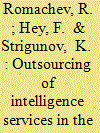

|
|
|
|
|
| Summary/Abstract |
MOST PEOPLE learned about the way the state security system functions in the US only when Edward Snowden fled to Russia. It has become abundantly clear that the visible system of US intelligence services is only the tip of the iceberg, while a huge branch of private intelligence agencies is hidden below the surface. The branch fits the classical interpretation of the US military-industrial complex with its huge political weight supported by lobbying and vast capital (for more details about the interaction between big capital and US military intelligence services, see [7, 8]). Private intelligence agencies are driven by the US military, the CIA, and the NSA, and rely on contracts awarded to them by the state for developing cyber weapons and systems to monitor Internet users, and for providing data analysis and informational and technical support.
|
|
|
|
|
|
|
|
|
|
|
|
|
|
|
|
| 15 |
ID:
160711
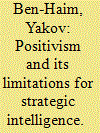

|
|
|
|
|
| Summary/Abstract |
Knowledge underlies rational choice between options. Predictive optimization is the prioritization of options according to their predicted outcomes based on available knowledge. The epistemological justification of predictive optimization is based on positivism, which asserts that facts and laws about the world exist and are discoverable. However, knowledge of human affairs in strategic adversarial interactions is often severely limited and erroneous: residual uncertainty is often vast. This results especially from deception and innovation by the adversary which introduce deep Knightian uncertainty. Consequently, predictive optimization is unreliable: outcomes may differ substantially from predictions. An alternative strategy for prioritization of options is info-gap robust satisficing: achieve critical goals (that are adequate but perhaps suboptimal) over a wide range of deviation of reality from current knowledge. The epistemological justification of robust satisficing is based on extending positivism to acknowledge and manage the unknown. Prioritization of options by robust satisficing manages both the limitations of knowledge and the need for achieving critical goals. This critique of positivism is not constructivist. Rather, we extend positivism to account for highly deficient knowledge. We present several examples and conclude by discussing the relation between inductive, abductive and deductive inference.
|
|
|
|
|
|
|
|
|
|
|
|
|
|
|
|
| 16 |
ID:
134927
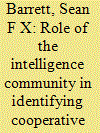

|
|
|
|
|
| Summary/Abstract |
While a lot has been written about the Department of Defense's (DoD) ongoing Strategic Choices and Management Review and the 2014 Quadrennial Defense Review, 1 far less attention has been paid to the role of intelligence and the Intelligence Community (IC) in both processes and, more broadly, in informing both defense and grand strategy.
|
|
|
|
|
|
|
|
|
|
|
|
|
|
|
|
| 17 |
ID:
172923
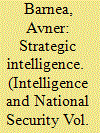

|
|
|
|
|
| Summary/Abstract |
Both the discipline of strategic intelligence at the governmental level and the competitive intelligence discipline constitute accepted methods of supporting decision in order to avert mistakes and prevent strategic surprise. So far, research has focused on national intelligence and intelligence in business separately however, it is possible to use experience accumulated in the business field to improve intelligence practice in national security and vice versa . The central innovation of this article is that mutual learning can be utilized in the context of a model that makes a distinction between a ‘concentrated surprise’ and a ‘diffused surprise’ to provide a breakthrough in the intelligence field for better prediction of the development of surprises.
|
|
|
|
|
|
|
|
|
|
|
|
|
|
|
|
| 18 |
ID:
101541
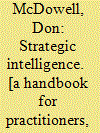

|
|
|
|
|
| Publication |
New Delhi, Cambridge University Press, 2009.
|
| Description |
viii, 269p.
|
| Standard Number |
9788175967441, hbk
|
|
|
|
|
|
|
|
|
|
|
|
Copies: C:1/I:0,R:0,Q:0
Circulation
| Accession# | Call# | Current Location | Status | Policy | Location |
| 055591 | 327.12/MCD 055591 | Main | On Shelf | General | |
|
|
|
|
| 19 |
ID:
177069
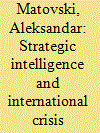

|
|
|
|
|
| Summary/Abstract |
High-quality strategic intelligence is commonly considered to be a stabilizing factor in international relations, steadying decision making and preventing misunderstandings and surprise attacks. This paper challenges this view by arguing that deep intelligence penetrations are some of the most destabilizing forces in high-stakes security crises. By exposing the opponents’ weaknesses and avenues of attack, intelligence penetration not only provides its beneficiaries with a potentially decisive offensive capability but also compels them to use it quickly, before the breach is discovered and the advantage is gone. Also, as the intelligence target is generally unaware of this capability, it does not serve as a deterrent that might force the target to the bargaining table. Thus, paradoxically, opposing sides are more likely to find a peaceful solution to crises when they do not have extensive strategic intelligence on each other.
|
|
|
|
|
|
|
|
|
|
|
|
|
|
|
|
| 20 |
ID:
171235
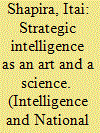

|
|
|
|
|
| Summary/Abstract |
This article describes a major output of strategic intelligence: conceptual frameworks. Drawing on concepts from epistemology, ontology, and analytical methodology, it finds a philosophical foundation for conceptual frameworks in pragmatism and the ideas of Wittgenstein. Through the production and use of conceptual frameworks, strategic intelligence is revealed as both art and science, performing both creation and discovery. The use of such frameworks enables strategic intelligence to notice shifts as they begin to emerge. The article highlights Israeli theoretical perspectives, illustrates the practical utility of conceptual frameworks by applying them to Israeli cases, and suggests that using them contributes to strategy.
|
|
|
|
|
|
|
|
|
|
|
|
|
|
|
|
|
|
|
|
|